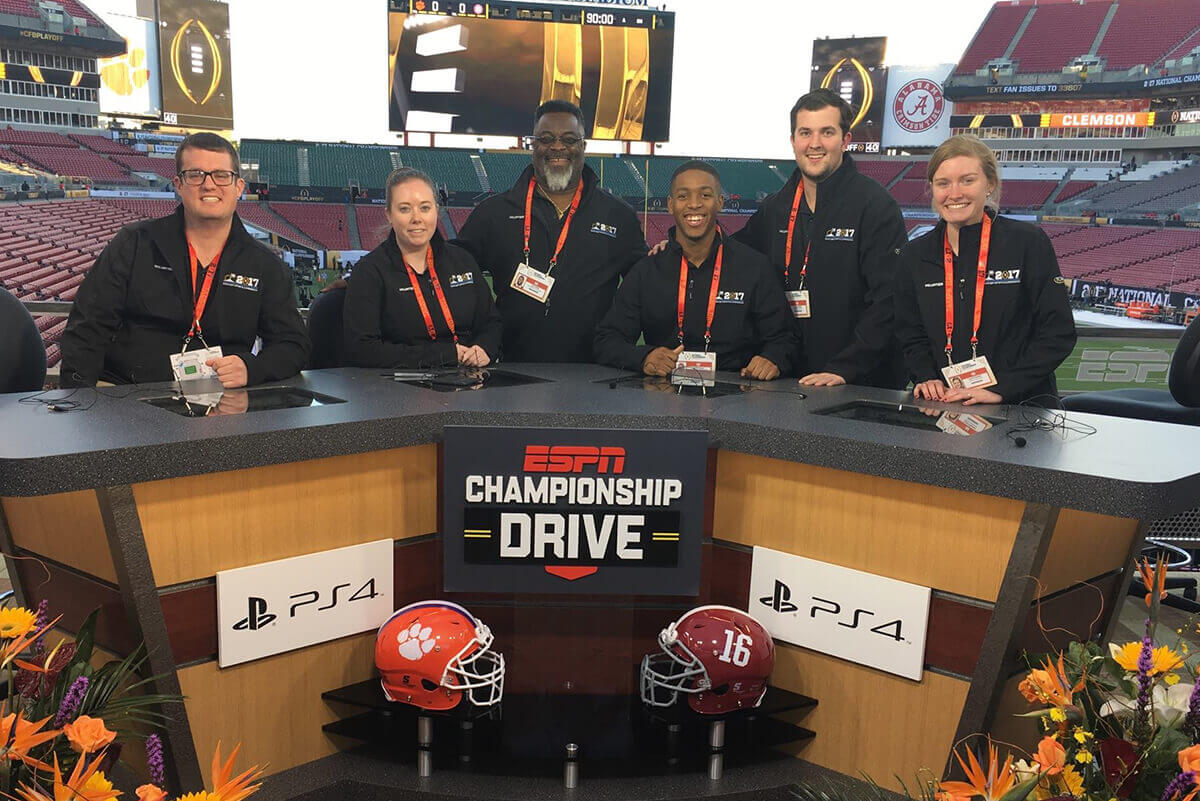Within four years, Shenandoah University business students could potentially get-hands on sport management experience at two Olympic games (the 2018 Winter Olympics in South Korea and the 2020 Summer Olympics in Tokyo), a Super Bowl (the 2019 contest in Atlanta), a College Football Playoff National Championship in Atlanta (2018) and the 2019 NCAA men’s college basketball Final Four.
The opportunities are all part of an overarching goal at the Harry F. Byrd, Jr. School of Business, which senior Malik Henry says is tied into a statement he often hears from Assistant Dean of Student Affairs and Associate Professor of Sport Management Fritz Polite, Ph.D., which is taking concepts “from theory to practice.”
“We want Shenandoah and the Byrd School of Business to be nationally recognized – that’s the goal,” Dr. Polite said. “If students want to train in this area [sport management/experiential learning], this is the place to do it.”
Polite has worked 10 Super Bowls over the years, as well as three Southeastern Conference (SEC) football championships, two women’s SEC basketball championships, two Atlantic Coast Conference (ACC) football championships and a men’s basketball NCAA Final Four. Polite stresses the importance of staying involved with the sports industry, something he learned from his own mentors. “You have to to stay connected to the industry,” he recalls them saying. “You have to be the pipeline for your students.”
Henry, who worked the 2017 College Football Playoff National Championship in Tampa Bay (shown in the photo above on the ESPN set), will return for the game in Atlanta. “I had such a great time working with a mega event with people with so much experience in what I could see myself doing,” he said of the Tampa Bay experience, that he decided to try for Atlanta, and ended up being selected as one of the students who will travel to the game with Polite and provide media operations support for the event. Henry is also part of a 35-member group of students and faculty who will work at the Alpensia Biathlon Centre in South Korea for the Olympics.
The hands-on ethos isn’t limited to sport management, either. For example, sophomore James Turner, whose concentration is in accounting, serves as the vice president of administration for the Alpha Kappa Psi business fraternity and as director of finance for the university’s Student Government Association. In the latter role, he provides financial advising and has helped new student organizations set up no-fee banking accounts.
Polite noted that both the young men are seizing opportunities, adding that Henry is not only the director of administration for the university’s Sport Business Club, but also one of its founders.
Both Henry and Turner agree the practical experience prized by the Byrd School means that their learning is based on real-world accomplishment. For example, Turner said that by planning an on-campus barbecue sponsored by the business school, he can say, well before graduation, that he planned an event that raised more than $1,500 for the campus veterans center.
Through his experience and coursework, Henry said his most important take-aways so far is an understanding about knowing when to compete, and the importance of networking, “Because you never know who can help you, and who you can help.”
And one of those who can help is Polite, who, as soon as he heard that Henry had an interest in sports ticketing upon graduation, told the younger man they could start working immediately on connecting with people in the field. The pipeline is most definitely open, working, and making a difference in student lives.
To learn about the Byrd School of Business visit su.edu/business/ and to learn more about the sport management major, go to su.edu/business/programs/undergraduate-program/sports-management/.




